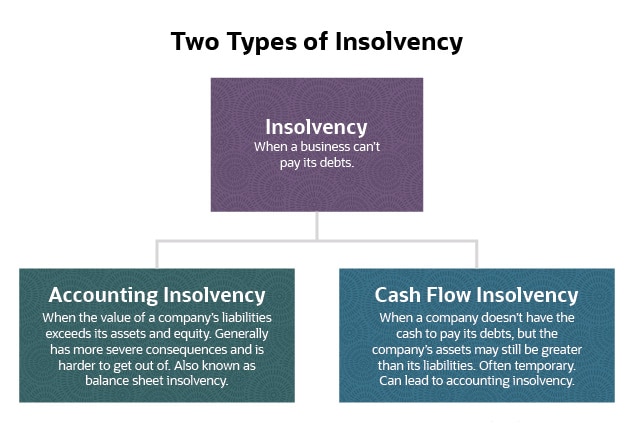Insolvency Practitioner - An Overview
Insolvency Practitioner - An Overview
Blog Article
Facts About Insolvency Practitioner Uncovered
Table of ContentsThe Buzz on Insolvency PractitionerGetting My Insolvency Practitioner To WorkThe Single Strategy To Use For Insolvency Practitioner5 Easy Facts About Insolvency Practitioner ExplainedEverything about Insolvency PractitionerInsolvency Practitioner - The FactsSee This Report on Insolvency Practitioner
Insolvency is when obligations are greater than the worth of the business, or when a borrower can not pay the debts they owe. A company can end up being insolvent because of a variety of scenarios that lead to poor capital. When encountered with insolvency, a service or individual can contact lenders directly and restructure financial obligations to pay them off.
Insolvency can lead to insolvency procedures, in which lawsuit will certainly be taken against the financially troubled individual or entity, and assets. Insolvency Practitioner may be liquidated to repay arrearages. Company owner may contact lenders straight and restructure financial debts into more workable installments. Lenders are usually responsive to this approach because they desire to be paid off and prevent losses, even if the settlement is on a delayed timetable.
The proprietor produces a proposition detailing exactly how the financial obligation may be restructured making use of expense decreases or other plans for assistance. The proposal reveals lenders just how the business may generate enough cash circulation for successful procedures while paying its financial obligations. Typically, a forgiven financial debt may be taken into consideration earnings by the Irs (IRS).
4 Simple Techniques For Insolvency Practitioner
When a service needs to pay increased rates for items and solutions, the company passes along the cost to the consumer. Instead of pay the enhanced cost, many consumers take their service elsewhere so they can pay much less for a product and services. Losing customers leads to losing revenue for paying the business's lenders.
When operations cease, so does the business's income. Some companies come to be financially troubled due to the fact that their goods or services do not develop to fit consumers' changing needs.
4 Easy Facts About Insolvency Practitioner Shown
Costs exceed earnings and bills stay overdue. Kinds of insolvency consist of cash-flow bankruptcy and balance-sheet insolvency. Cash-flow bankruptcy occurs when a business has the possessions to cover their debts but they remain in the incorrect kind, such as realty as opposed to fluid funds. Balance-sheet insolvency, on the various other hand, indicates an absence of assets in any form to cover financial obligations.
The internal revenue service states that a person is bankrupt when the overall obligations go beyond complete assets. Insolvency Practitioner. A insolvency, on the various other hand, is a real court order that illustrates how a bankrupt individual or service will certainly repay their financial institutions, or exactly how they will certainly offer their possessions in order to make the settlements
The Main Principles Of Insolvency Practitioner
If that scenario expands longer than prepared for, it can result in personal bankruptcy. When a business or individual is bankrupt, they can not satisfy their financial responsibilities. Solvency is when you have adequate funds to cover the payments you owe. A firm is thought about solvent when they have a lot more properties than responsibilities.

Comprehending the variables that can bring about insolvency, such as overspending, can aid you avoid insolvency and its effects.
The Greatest Guide To Insolvency Practitioner
It is well understood that supervisors and policemans of firms (and managers of limited responsibility companies) owe fiduciary obligations to their companies and their investors (or members). These fiduciary responsibilities are defined by state statutes and, though there are variations from state to state, they generally include a responsibility of loyalty and a task of treatment.
The duty of care requires directors view publisher site and officers to exercise diligence, to make informed decisions, and to act in good faith so that their actions are in the most effective interest of the company. Though beyond the scope of this discussion, some states enable these tasks to be restricted either by so noting in the organizational documents or following various other demands.
The Basic Principles Of Insolvency Practitioner

Beware concerning offering investors special treatment at the expense of lenders (e.g., licensing and moneying a dividend or a stock redemption). Be cautious regarding special treatment between classes of investors. Make practical initiatives to discover all the truths before taking a specific strategy; supervisors ought to genuinely believe that any kind of choices made remain in the most effective rate of interests of the corporation in its totality (i.e., choices will be reviewed in knowledge due to the impact of such actions on the firm).
In any type of bankruptcy or bankruptcy proceeding, payments made to particular lenders at the expense of various other lenders can be clawed back, especially if there is some link between the company and the financial institution. Think about proposing at a yearly shareholder meeting (or any various other meeting of investors) a resolution attesting that all prior business choices and activities taken by the directors and police officers of the company were taken in good belief after an exercise of practical care.
The Greatest Guide To Insolvency Practitioner
Fully reveal any kind of individual or company connections with events on the various other side of transactions including the company to stay clear of the look of a conflict of interest. In examining possible fund elevating transactions or a sale of assets of the distressed firm, realize that these transactions may be scrutinized later due to any kind of subsequent expansion of directors' fiduciary tasks to consist of financial institutions.
Report this page